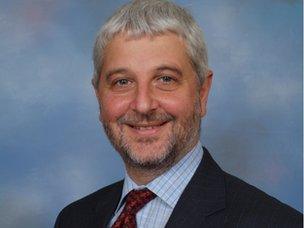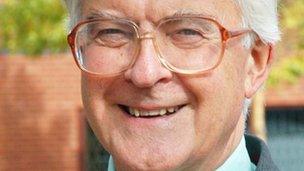The future of GCSEs: Expert opinions
- Published
The education secretary's announcement that he is abandoning his plans to scrap GCSE exams has refocused the spotlight on what the future holds for the qualification.
Michael Gove had wanted to bring in what he described as more rigorous exams in some core subjects from 2015 - but this plan has been shelved.
GCSEs will be retained, despite having been condemned by the education secretary as lacking rigour.
GCSEs (General Certificate of Secondary Education) were first sat in England, Wales and Northern Ireland in 1988, replacing O-levels and CSEs. This summer - for the first time in the qualifications' 24 year history - there was a fall in the proportion of GCSEs awarded an A*-C grade. There was also a fall in the proportion of pupils receiving the top A* and A grades.
The BBC News website has asked some key opinion-formers in the world of education what they think is the best way forward for assessment at age 16.
Two-tier system

Brian Lightman, general secretary of the Association of School and College Leaders, says a debate needs to be had about the purpose of post-16 assessment before more changes are made.
GCSE has been a very successful qualification catering for a very wide range of pupils. But the many recent changes to it - exemplified by the current problems with the GCSE English exam - show we need a full review of how any qualification at 16 operates.
The first thing to do is to ask what is wrong with GCSEs and then look at the options to replace it - if we need more rigour, do we need a new qualification or do we just need tighter criteria?
The biggest issue is that there has not been a debate about what the curriculum should look like for these young people, particularly with the raising of the participation age to 18.
We don't want a return to a two-tier system and so I think any future plans will need to be based on a suite of qualifications catering for the many different pathways that students might want to follow. We don't want to end up with one qualification that tries to be all things for all people.
Bring back O-levels

Nick Seaton, secretary of the Campaign for Real Education supports more rigorous academic exams for the most able and more practical exams for the less gifted.
GCSEs haven't been very successful since their introduction because it's impossible to have a single exam to cater for all abilities and there have been problems regarding their veracity.
We would very much like to bring back O-levels in this country. International GCSEs are very popular overseas, so why not give schools here the chance to use them? Society needs all sorts of people, some academic and some practical, so we should build on everyone's strengths and abilities. By a single system of exams, you narrow everyone's choice and try and make everyone the same which seems ridiculous.
We do need to have some form to assessment at 16 as it is a key stage in youngsters' lives when they need to have mastered the general, before specialising in things.
Too many Lego blocks?

Dr Kevin Stannard, director of learning at the Girls Day School Trust, believes GCSEs could be slimmed down to allow pupils to cover more subjects.
GCSEs are far too assessment driven, the hoops are too obvious and encourage teaching to the test. They are too chunky and require a certain number of recommended hours, so schools can only fit a limited number into the curriculum.
What if GCSEs weren't all the same size? What if they were smaller and we could do more? Like Lego bricks, you can only build so many, and they don't all have to be the same size. We shouldn't regard GCSEs as a given.
We need to ask why our pupils aren't doing a broad and balanced curriculum up to the age of 16, before they go on to specialise. It's because there isn't enough time in the day - if you want to do geography, you have to do geography GCSE and it takes up a certain number of periods.
At present, most curriculum time is given over to examinable subjects, and the time slots are indivisible, representing a standard GCSE-sized chunk in each case. This inevitably means that pupils have to make invidious choices between subjects, since they can't do everything. If we reduced the number of slots, pupils could study to a similar depth but in fewer topics.
Also, why do we have a battery of tests at an age when most people haven't finished school? We would probably find we do want to do some testing at age 16, but it's not the exam we have currently - they're too intrusive and too limiting.
Assess flexibly

Bill Watkin, operational director at the Specialists Schools and Academies Trust, believes more flexible assessment would improve the current GCSE model.
Are GCSEs intended to measure a child's capabilities at the end of his compulsory schooling? If so, and with children expected to stay in education beyond 16, is this the right time to have exams at all? Perhaps we should do away altogether with 16+ exams.
But we do not need to return to a two-tier exam. We need to improve the one we have. Children develop at different rates and different ages. They need to be free to step up or step down to suit their abilities as they develop. They cannot do this if there are two entirely different and mutually exclusive courses.
We do need to consider the different subject content, learning styles, home environments and contextual characteristics of students when designing assessment methodologies. Sometimes modular is good; sometimes coursework is good; sometimes teacher assessment is good; sometimes rote learning and terminal exams are good.
But we should not confuse the issue: flexible assessment design and rigorous standards are perfectly compatible. We do not have to revert to one assessment model in order to preserve rigour and high standards, particularly an assessment model that does not reflect the techniques and aptitudes of 21st century schooling.
Learning by doing

Lord Baker, Chairman of the Edge Foundation, proposes a programme of studies for 14 to 18-year-olds where academic and hands-on subjects are combined.
It's vital that schools and colleges provide education which develops practical skills and personal qualities as well as subject knowledge. This has to include opportunities to learn by doing.
This isn't about the skills needed for a particular job. It's about understanding how maths and English - and many other school subjects - are used at work and in adult life.
And not just that: it's also about teamwork, solving problems and communicating with other people. Exams have to be capable of recognising all these talents.
The vast majority of young people now stay in education or training until they are 18. We don't need a school-leaving certificate for 16-year-olds.
Instead, we need a general test at 14 to check student progress and help guide subject choices.
After that, students should combine academic and hands-on subjects and earn credits towards a high school diploma at 18.